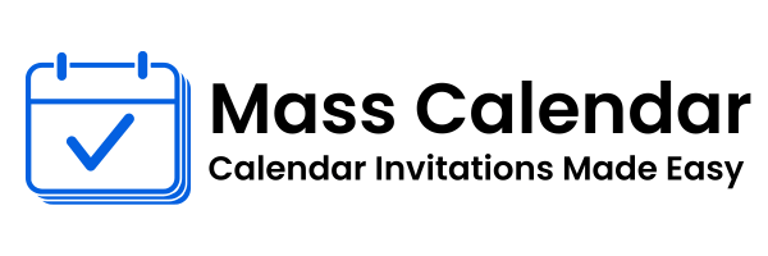The Future of Scheduling: A Complete Guide to Bulk Meeting Invites
In today’s fast-paced digital workplace, meetings are the backbone of collaboration, decision-making, and innovation. Whether it’s a corporate board meeting, a project review, or an educational seminar, ensuring that everyone is properly scheduled is vital. However, as organizations grow, so does the challenge of managing invitations. This is where the concept of bulk meeting invites becomes increasingly important.
BLOG
9/1/20254 min read


In today’s fast-paced digital workplace, meetings are the backbone of collaboration, decision-making, and innovation. Whether it’s a corporate board meeting, a project review, or an educational seminar, ensuring that everyone is properly scheduled is vital. However, as organizations grow, so does the challenge of managing invitations. This is where the concept of bulk meeting invites becomes increasingly important.
Rather than sending out individual invites to each participant, a time-consuming and error-prone process bulk scheduling allows organizers to coordinate meetings more efficiently. From large organizations to small teams managing recurring events, the ability to send bulk meeting invite options streamlines communication and ensures participation at scale.
Why Bulk Meeting Invites Matter
A single misstep in meeting scheduling can result in wasted time, miscommunication, and low attendance. For enterprises and event organizers handling hundreds or even thousands of participants, manual scheduling becomes unmanageable. Bulk invites solve this by enabling organizers to:
Save significant time in scheduling.
Minimize the chance of missed participants.
Ensure uniformity in meeting details (date, time, agenda).
Simplify recurring meetings for teams across different time zones.
In essence, bulk scheduling transforms the traditional invitation process into a seamless experience for both organizers and participants.
Common Scenarios Where Bulk Scheduling Helps
1. Corporate Training and Workshops
Large organizations frequently run workshops, training sessions, and upskilling programs. Using mass meeting invite processes ensures every employee receives the same invite and has equal access to materials and updates.
2. Educational Institutions
Schools and universities rely heavily on calendar scheduling for lectures, webinars, and parent-teacher conferences. Send mass meeting invite capabilities can reduce administrative burden while keeping everyone informed.
3. Conferences and Webinars
Event organizers often handle thousands of participants, each requiring timely reminders. Send mass calendar invite options help standardize communication and prevent chaos on event day.
Platforms Commonly Used for Bulk Invites
Bulk scheduling is supported across multiple digital ecosystems. Two major platforms where organizations frequently coordinate bulk scheduling are:
Bulk calendar invites in Google: Ideal for teams already using Google Workspace, allowing large-scale scheduling across Gmail and Google Calendar.
Mass calendar invites in O365: Suited for enterprises leveraging Microsoft 365, with integrated functionality for Outlook users.
Both platforms make it possible to ensure that no attendee is left behind, regardless of geographical spread.
Best Practices for Sending Bulk Meeting Invites
Plan Ahead
Before sending a bulk invite, finalize key details such as agenda, duration, and participants. This prevents confusion and reduces the need for corrections later.Segment Participants
Not every invite needs to go to every employee or student. Group your audience based on departments, teams, or relevance to ensure only the right people receive the invitation.Use Clear Titles and Descriptions
A generic “Meeting Invite” subject line can get lost in inbox clutter. Instead, be specific about the purpose for example, “Quarterly Strategy Review” or “Advanced Training Webinar.”Mind Time Zones
In today’s global environment, scheduling must consider international participants. Tools often support automatic adjustments, but it’s wise to double-check that bulk invites reflect correct times.Set Reminders
Sending bulk invites is only half the job. Use calendar notifications and reminders to ensure attendees actually show up on time.Track Responses
While bulk invites go out in one go, tracking RSVPs ensures you have visibility into who is attending, who declined, and who has not yet responded.
Overcoming Challenges in Bulk Scheduling
While efficient, bulk invitations do present unique challenges:
Email Overload: Inboxes are already crowded. To avoid overwhelming recipients, bulk invites should be concise and purposeful.
Duplicate Invites: Sometimes participants belong to multiple groups. This can result in them receiving the same invitation more than once.
Personalization: Bulk invitations can feel impersonal. Adding small touches like the recipient’s name or specific details relevant to their role can make them more engaging.
Despite these hurdles, thoughtful planning and structured communication can ensure smooth scheduling.
The Role of Bulk Invites in Remote and Hybrid Work
Remote and hybrid work environments rely on digital calendars as their central hub of collaboration. Here, multiple calendar invites help employees balance professional and personal schedules while ensuring they never miss an important meeting.
For hybrid events where some attendees join virtually and others in person bulk scheduling becomes even more critical. It ensures consistent communication across platforms and keeps dispersed teams aligned.
Tips for Enhancing Meeting Attendance with Bulk Invites
Choose the Right Time: Analyze past attendance patterns and pick time slots that work best for most participants.
Include Key Links: Whether it’s a Zoom link, Google Meet, or Teams conference link, always add access details directly in the invite.
Attach Documents in Advance: Providing the agenda or pre-reads within the calendar invite saves time during the actual meeting.
Encourage RSVP Updates: Ask attendees to update their responses so you can plan resources accordingly.
The Bigger Picture: Bulk Scheduling Beyond Business
Interestingly, bulk scheduling is not just limited to corporate environments. Communities, NGOs, and social groups also benefit from the ability to send mass meeting invite options. From volunteer drives to social events, bulk scheduling supports coordination at scale and minimizes confusion.
Similarly, sports organizations, hobby clubs, and local associations rely heavily on shared calendars and bulk invites to bring their members together.
Looking Ahead: The Future of Bulk Meeting Invites
As workplace technology evolves, bulk meeting scheduling will continue to integrate with advanced features such as:
AI-driven smart scheduling based on participant availability.
Automated conflict resolution to prevent overlapping meetings.
Analytics dashboards that track meeting attendance trends.
Greater integration with task management and collaboration platforms.
In the long run, bulk scheduling will become a standard expectation for teams operating in digital-first environments.
Conclusion
Efficient scheduling is no longer just a matter of convenience, it's a necessity for productivity and collaboration in today’s connected world. The ability to send bulk meeting invite or manage mass calendar invites in O365 or Google allows teams to save time, reduce administrative burden, and focus on what truly matters: meaningful collaboration.
From education to corporate boardrooms, and from nonprofits to hybrid events, bulk scheduling is shaping the future of how teams connect. By adopting thoughtful strategies and best practices, organizations and individuals alike can make the most of this powerful approach to meeting management.
MassCalendar.in
Send Bulk & Mass Calendar Invites Instantly
CONTACT
Meetings
+44 (0) 203 916 5117
© 2025. All rights reserved.
Help?
